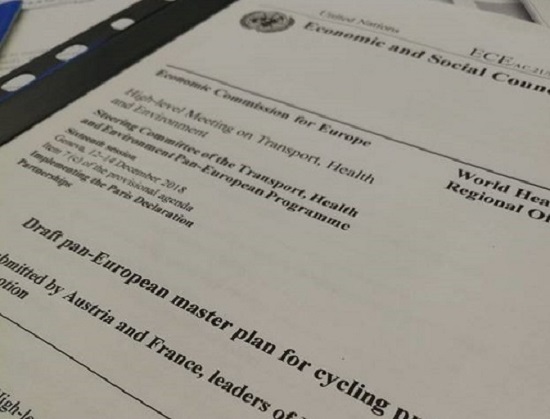
54 countries soon to have detailed guidance on how to double cycling across the region by 2030
Doubling cycling is the ambition of the pan-European Master Plan for Cycling Promotion, covering 54 countries across the entire Europe region of the World Health Organisation. This Master Plan, when finalised, will provide guidance for the very first time to many of these countries about how to support cycling at the national level.
The Transport, Health, Environment Pan-European Programme (THE PEP) has now put an advanced draft of the Pan-European Master Plan for Cycling Promotion firmly on the table. This joint initiative of the World Health Organisation (WHO) and United Nations Economic Commission for Europe (UNECE), under the leadership of Austria and France, asked the Partnership on Cycling (a spin-off of the former informal ECF National Cycling Officers Network) to develop a draft of a continent wide plan to promote cycling. 10 partnership meetings later, the result is this advanced draft, which will be put to THE PEP at their 5th high-level meeting (22nd - 24th October 2019) for final adoption. ECF has been pushing hard to make sure that the draft would be as ambitious as possible. Taking into account that we deal with countries with extremely different contexts for cycling, say between the Netherlands and Azerbaijan, we think that we will have a very encouraging result!

The draft plan sets out 5 policy objectives to be met by 2030:
- Double cycling in the region and increase it in every country;
- Develop and implement national cycling policies, supported by national cycling plans, in the member States of the United Nations Economic Commission for Europe (ECE) and the World Health Organization Regional Office for Europe region;
- Increase the safety of cyclists in the ECE and WHO member States and halve the number of fatalities and serious injuries of cyclists per kilometre cycled annually;
- Integrate cycling into health policies;
- Integrate cycling into land use, urban and regional planning, including for infrastructure.
Achieving these goals would come with numerous benefits. Using the WHO’s HEAT for Cycling tool it has been calculated that doubling cycling would prevent 30,000 premature deaths per year, with indirect economic benefits resulting from this amounting annually to €78 billion.
The draft sets out 30 policy recommendations that signatory states (and others) could adopt to promote cycling, depending on their national circumstances. These are categorised into 10 broader recommendations:
- Develop and implement a national cycling policy, supported by a national cycling plan
- Improve the regulatory framework for cycling promotion
- Create a user-friendly cycling infrastructure
- Provide sustainable investment and efficient funding mechanisms
- Include cycling in planning processes and facilitate multimodality
- Promote cycling through incentives and mobility management
- Improving health and safety
- Improve cycling statistics for use in efficient monitoring and benchmarking
- Promote cycling tourism
- Make use of new technology and innovation
ECF is eagerly awaiting the approval of this draft, not just because it will be the combination of five years of work, but also because of the broad nature of the document, covering a large set of cross sectoral policy goals. October 2019 looks set to be a good month for cycling.
Contact the author
Recent news!
Upcoming events
Contact Us
Avenue des Arts, 7-8
Postal address: Rue de la Charité, 22
1210 Brussels, Belgium









